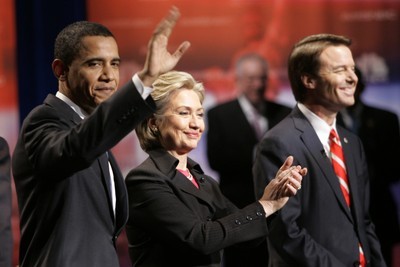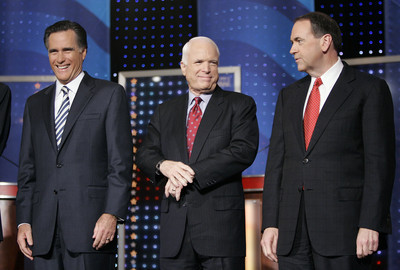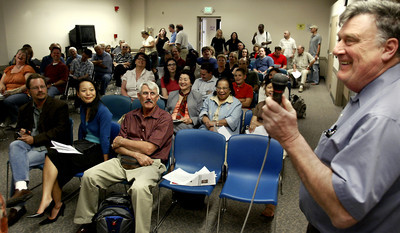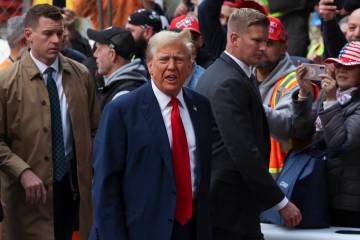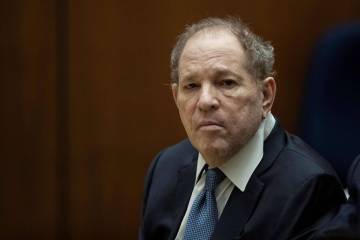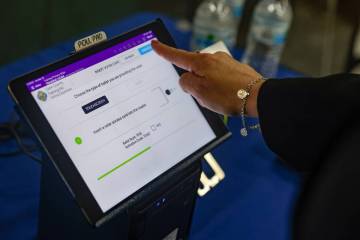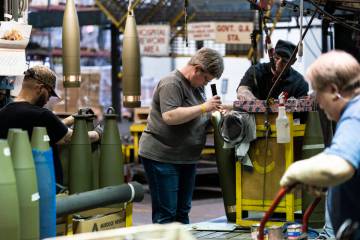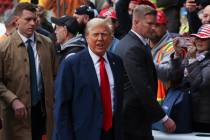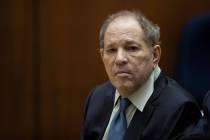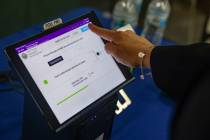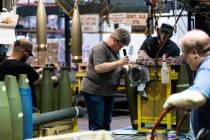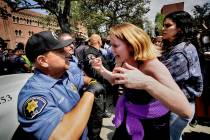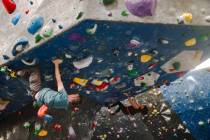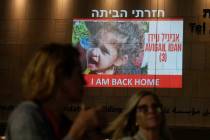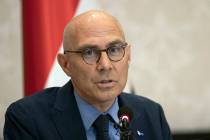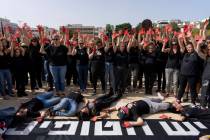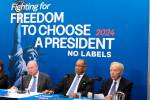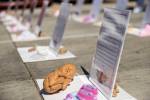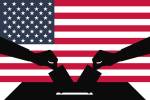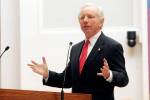WHAT’S ON THE LINE
What to expect when you're expecting a caucus? Especially when it's your first?
Nevada Republicans and Democrats hold presidential nominating caucuses today, giving you a chance to have more input than Nevadans have ever had before into whom the parties put on the ticket in November.
It's one of the most exciting and unpredictable races in history, on both sides, and it's not too late for you to join in.
If you have been a registered Republican since Dec. 19, get to your caucus site by 9 a.m. today. If you want to caucus for a Democratic candidate, get to your site by 11 a.m., even if you're an independent or a Republican, as long as you're eligible to vote.
This is your only chance to have a say in whom the presidential candidates will be. Presidential candidates will not be on the ballot in Nevada's regularly scheduled August primary.
Today's caucuses are not Nevada's first, they are just the first ones to be a big deal.
Nevada Democrats have had caucuses for decades, but they were small affairs and usually occurred after the nominee already had been chosen by other states.
Nevada Republicans didn't have a presidential nomination contest at all, only county and state party conventions where delegates were chosen.
The difference this time is that the caucuses are in January, making Nevada one of the first states to weigh in and giving the state more influence as a result. Both parties' nominations appear up for grabs, with multiple Democrats and Republicans still in contention.
Nevada is divided into more than 1,700 precincts, each of which will meet separately to select delegates. The number of delegates assigned to each precinct follows a formula based on the number of registered party members.
The Democratic caucuses will be held at more than 500 locations across the state, more locations than there were polling places in the 2006 election. Some locations will have multiple precincts. For example, several precincts might meet in different classrooms at a school.
The Democrats allow same-day registration for the caucus. If you are eligible to vote but have not registered, you can go to your precinct's site, fill out a voter registration form, and participate in the caucus. To find the correct location, enter your address in the caucus locator at www.nvdemscaucus.com or call 702-737-8683.
The Democrats also have special precincts for voters who work on or near the Strip. These precincts became the subject of controversy this week when a lawsuit sought to wipe them out, contending they were unfair. But a judge gave the precincts the OK on Thursday.
The at-large precincts are located in the convention areas of the Bellagio, Caesars Palace, Flamingo Las Vegas, Luxor, The Mirage, Paris Las Vegas, New York-New York, Rio and Wynn Las Vegas.
You must show a work ID for a business within 21/2 miles of the Strip -- it doesn't have to be one of the hotels where the caucuses are -- and you have to sign a form swearing that you are scheduled to work within an hour of the caucus, which is expected to last more than an hour.
Doors close at 11:30 a.m. Anyone who arrives after that will be turned away.
The Republicans do not have special precincts for workers. They meet at more than 100 locations. The Republicans require voter registration 30 days in advance. If you have been a registered Republican since Dec. 19, look up your caucus location at www.nvgopcaucus.com or by calling 702-258-9182.
Doors close at 9:10 a.m.
The Democratic and Republican caucuses are modeled after Iowa's traditional precinct caucuses, which were held on Jan. 3. The parties follow different models.
Democrats assemble into groups, one for each candidate. You can caucus for any candidate; there is no ballot. Once the groups are assembled, some of them will be too small to get a delegate, so they will split up and join other groups or go home. After the groups re-assemble, each group gets a portion of the total delegates allocated to that precinct.
If you don't like your choices, you can caucus for "uncommitted." That's what Senate Majority Leader Harry Reid plans to do in his hometown of Searchlight, so as to remain neutral.
At most precincts, a candidate must get 15 percent of total attendance to earn a delegate, or be "viable."
Each precinct will have a trained volunteer, the precinct chair, running the show, so anyone who is confused about the process shouldn't worry.
Each campaign gets to sign off on the final results so there is no disagreement. The precinct chair then calls in to an automated system, punching in codes for the precinct and following prompts to enter delegate numbers.
The automated system, which party officials say is secure, feeds into the Democratic Party's computers. Results will start appearing, precinct by precinct, on the www.nvdemscaucus.com Web site as they come in.
The party expects to have the delegate counts in by 2 p.m. Turnout numbers will come in a little while later.
The delegates elected in the caucus will go on to county conventions, where they will elect delegates to the state Democratic Convention, who will elect delegates to the national Democratic Convention scheduled for August in Denver. The caucus technically is nonbinding, meaning the delegates who are elected can decide to support a different candidate than the one they caucused for.
The Republicans also are electing delegates to go to county conventions and elect state Republican Convention delegates who will elect Republican National Convention delegates. That convention is scheduled for September in St. Paul, Minn.
But the Republicans, both here and in Iowa, elect delegates separately from voting on presidential contenders. After they choose delegates in a straightforward election process, they fill out secret ballots stating their presidential choice. The party had hoped to use voting machines, but that didn't work out and paper ballots will instead be used.
There will be seven candidates on the ballot, based on criteria approved by the state party: Rudy Giuliani, Mike Huckabee, John McCain, Ron Paul, Mitt Romney, Fred Thompson and Duncan Hunter.
The caucus locations will collect results for all the precincts at each location, then phone the results in to Nevada Republican Party headquarters. The raw vote totals will be shown on the www.nvgopcaucus.com Web site as they come in. Republicans expect to have the votes counted by 1 p.m.
Since the delegates elected at the Republican caucus aren't necessarily committed to a candidate at all, the Republican contest is also technically nonbinding.
Despite their different formats, both contests require campaigns to organize heavily at a grass-roots level if they want to win, since candidates' supporters have to be at a certain place at a certain time.
The Republican caucus, which is a smaller-scale effort than the Democrats' and hasn't attracted as much candidate attention, hit a few snags, but party officials say the problems have been worked out.
About 20 percent of registered Republicans in Washoe County were sent postcards with the wrong caucus location because of "flawed data," Republican Caucus Director Hans Gullickson said. All those affected were sent new, corrected postcards and received a phone call, he said.
The party also decided to allow provisional voting for people who say they are registered Republicans but can't be found on a particular location's voter rolls, Gullickson said. Those ballots will be counted only after they have been verified.
"On the off-chance that somebody inadvertently goes to the wrong caucus location, we still want them to participate," he said. Such voters will have to sign an affidavit, he said.
Gullickson declined to say how many ballots were printed, which would indicate how much turnout the Republicans are expecting. "Enough to make sure everybody who attends has a ballot," he said.
Democratic turnout is expected to be larger than the Republicans' but also is a major uncertainty. Estimates range from 30,000 to 100,000. The high end would represent 25 percent of registered Nevada Democrats, a high number even for a primary election, which is easier to participate in than a caucus.
In the next couple of days, the political limelight currently on Nevada will have moved on. Campaign offices will be abandoned, staffers evacuated.
Those who have been working on the effort in Nevada for more than a year can hardly believe it's finally happening, but are happy with the results of an upstart caucus that many were reluctant to take seriously until it was suddenly at the center of the storm.
"It's turning out better than we ever hoped," said Kirsten Searer, deputy executive director of the Nevada Democratic Party. "It's clear that we are going to be critical in this process. This is a race that's too close to call, and the eyes of the world are on our state."
Contact reporter Molly Ball at mball @reviewjournal.com or (702) 387-2919.
PARTICIPANT INFORMATION • Today's caucus start time for Republicans is 9 a.m. • Democrats will begin caucusing at 11 a.m. Democrats and Republicans who are unsure where they should report for their caucus should visit the parties' Web sites. • Find your Democratic caucus site • Find your Republican caucus site



